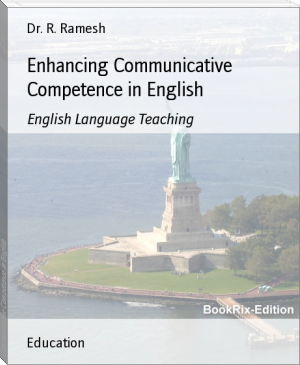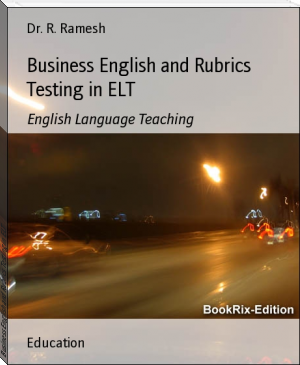Cognitive Development in English Language Teaching, Rajesh Lane [best motivational books for students txt] 📗

- Author: Rajesh Lane
Book online «Cognitive Development in English Language Teaching, Rajesh Lane [best motivational books for students txt] 📗». Author Rajesh Lane
These types of teacher created and learner created contextual practices are to improve the cognition of the learners and learner’s effective language. Participants negotiate as per the nature of context in which they are engaged.
It is evidently possible that the second language acquisition and the creative process can be developed while developing cognition of learners. The context gives the exact meaning for language. Emergent context can allow the learner to create. Any task can be achieved through cognitive development practice which improves the learner’s language. Any communication gap can be filled if learner’s cognition is developed. Hence the researcher has undertaken to study the hypothesis and establish the same.
CHAPTER FOUR
ANALYSIS
In chapter three twenty six tasks have been identified, which would promotethe cognitive development and language acquisition at the U . G level language learners. Of these twenty six tasks, twelve were selected for preparing the analysis. The twelve tasks were identified because these tasks are more language oriented than the other fourteen; and also since there is factors like time and space constraint, the tasks had to be limited.
The sample selected are twenty five in number and they are the third year English major U. G students of Scott Christian College, Nagercoil. The samples included the high achievers, the average achievers and the low achievers. The study believed that the students who have average language fluency can acquire from other students through meaningful interaction. Due to the contextual use of language, the usage can be understood by the learners very easily when the socio-economic cultural contexts were brought into the classroom, the learners could understand and create various contexts on their own. Consequently, the learners were able to interact easily with the help of their internalized system or metacognition. By this metacognition the learners tried to solve various problems which s / he encountered. That is, s / he applied his / her language in various situations. If it was appreciated s / he came to understand the contextual use of language. When others spoke, s / he acquired the language properly. The new contexts or the emergent contexts could allow the learner to think and create on their own. Language is closely related to human psychology. It infiltrates into the receiver’s mind and attains the possible result. The learners at the U . G level should have the capability to use their cognition effectively to communicate spontaneously.
Cognition helps the learners to solve their problem at any situation. Cognitive development process strengthens the learners to improve their cognition and consequently to enhance the language acquisition process and their creativity. Any new situation is a problem, and the learner has to tackle it by his / her cognition which involves the process of insight-formation and problem-solving. When the language is contextualized the learner can acquire the language to use it for suitable context. Negotiation is more important than the written form in the communication process. To negotiate sensibly more cognition is needed.
The researcher could understand from a study among the third year U.G students that, the cognitive development is the right process to enhance second language acquisition and to speed up their creativity.
The condition of the students before introducing them to the cognitive development process was that they could not express the utterance or opinion orally. Learners were writing in the ordinary simple sentences with mistakes without knowing the contextual use of words. Their language was less effective in the initial stage.
After introducing cognitive development process at the U . G level, the learners could speak effectively and write effectively according to the contexts. The learners were very much interested to acquire the language and to improve their creativity through the process of cognitive development. After the introduction of cognitive development process the learners could internalize the contextual use of language. They could understand their mistakes and they corrected their language by themselves. The joyful classroom atmosphere and the interesting contexts created by both researcher and the students were presented to the U . G students. Learners interacted and created many new utterances effectively according to the emergent contexts.
Before entering into to cognitive development practices the learners were requested to listen to the utterances carefully. Learners were asked to correct the mistakes committed by his / her partner after finishing his / her talk through repeating the same utterance correctly to acquire the contextual use of language. Yet the researcher did not find fault with students for making the mistakes. Instead the researcher helped them to improve their cognition and to solve the problems that emerge at any context. The new context or the emergent context would be the problem; the learner has to solve it. To improve the problem solving capacity or the creativity, emergent contexts were presented. The mistakes committed by the speaker were underlined and the correction made by the listener have been marked in bold letters.
The Researcher used the following cognitive development practices to enhance second language acquisition and to improve the creativity of U . G level learners:
( a ) Information gap activities:
Activity – ( i )
Researcher: Shall we start from getting to know each other?....
Students: OK… We are awaiting to know..
Researcher: Sit in pairs; please…
Interview your partner and introduce your partner to the class.
Shanthi: Your name please?.....
Ronaldo: Ronaldo.
Shanthi: Coming from?...
Ronaldo: Nagercoil.
Shanthi: What is your hobby?..
Ronaldo: Watching T . V and playing football.
Shanthi: Football player, are you?
Ronaldo: Yes,
Shanthi: Did you win any match?...
Ronaldo: If I got a chance I can win…
Shanthi: I think you want to say if you get any chance you can actively participate.. isn’t it?..
Ronaldo: Exactly; if I get..
Shanthi: Thanking you Ronaldo.
My partner is Ronaldo; Coming from Nagercoil. His hobby is watching T . V . He is a football player
eager to participate; if he gets a chance..
( Every learner interviewed his / her partner and introduced him / her to the class )
Activity-(ii)





Comments (0)